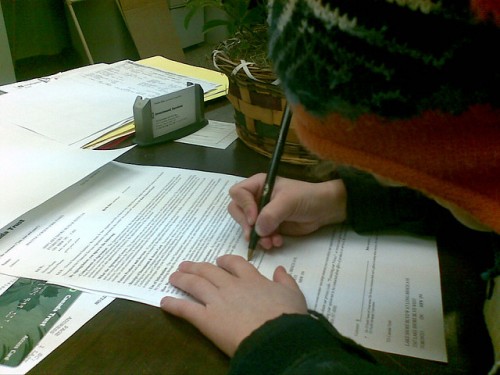
This case is certainly unfortunate but it’s not unique. What most people don’t understand is that when you cosign a loan, you are accepting full responsibility for repaying that debt in the event that the primary borrower defaults on the loan. The cosigner is liable for the debt regardless of the reason that the original borrower defaults. It does not matter if it’s because the person skips out on the debt, gets sick, becomes unemployed, or even dies. The banks make no distinction. The cosigner must repay the debt. Period.
Even when people read this in the loan documents, some part of their mind still thinks there will be some “out clause” and they won’t really get stuck with the debt. They seem to believe that there is no way that a bank will stick them with the debt if the original borrower defaults. The thing is, banks are not compassionate. They are in business to make money. They don’t care why the original borrower can’t pay, they just want their money. That may seem harsh, but it is what you agree to when you cosign.
Imagine if banks made exceptions. Everyone would have some hard luck story about why the original borrower could no longer pay and why they, as cosigner, shouldn’t get stuck with the debt. That would put the banks in the position of determining whose hardship is the worst and wading through documents to prove claims of death, disability, and unemployment. It would become a mess. The end result would be higher borrowing costs for all customers and probably a refusal to accept cosigners at all. That would mean that people who need credit and are responsible wouldn’t be able to get it. As cold as it seems, the policy of not making exceptions is the best for the greater good.
Yes, it’s tempting to cosign a loan to help out a struggling kid or other friend/relative. If they don’t have the credit worthiness to get the loan on their own, it’s natural to want to use your own credit history to help them out. But think carefully before you agree to cosign. Do you have the means to pay back that loan if the borrower defaults? If the answer is no, then do not cosign no matter how much you want to help or how much the other person begs. You will get stuck with the debt if the original borrower defaults for any reason. There will be no mercy or compassion from the bank. You will be on the hook for that debt and if you can’t pay, your good credit history will go down the drain.
If you still want to cosign but you don’t have the ready cash to pay back the loan, at least make sure there is some type of insurance in place to make sure it’s paid back. That may mean life insurance or some type of loan protection policy. Yes, it’s expensive, but it’s generally not nearly as expensive and ruinous as getting stuck with a debt you cannot pay. Had the kid in the news story had a life insurance policy, his mother would not be in her current position.
Believe it when the bank tells you that you are responsible for paying back any loan you cosign. They aren’t kidding and there is no mercy for death or any other reason. Think long and hard about your ability and willingness to pay before you put your name on that loan. Otherwise you could find yourself paying back thousands of dollars that you can’t afford.
(Photo courtesy of gordasm)

Jennifer Derrick is a freelance writer, novelist and children’s book author. When she’s not writing Jennifer enjoys running marathons, playing tennis, boardgames and reading pretty much everything she can get her hands on. You can learn more about Jennifer at: https://jenniferderrick.com/.






Comments